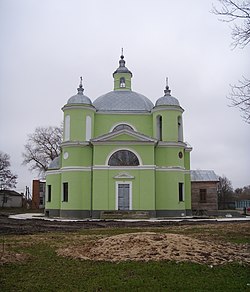Pogarsky District
Погарский район | |
|---|---|
 The Trinity Church, Grinyovo (1802) | |
 Location of Pogarsky District in Bryansk Oblast | |
| Coordinates: 52°33′N 33°15′E / 52.550°N 33.250°E | |
| Country | Russia |
| Federal subject | Bryansk Oblast[1] |
| Administrative center | Pogar[1] |
| Area | |
| • Total | 1,196 km2 (462 sq mi) |
| Population | |
| • Total | 28,333 |
| • Density | 24/km2 (61/sq mi) |
| • Urban | 35.3% |
| • Rural | 64.7% |
| Administrative structure | |
| • Administrative divisions | 1 Settlement administrative okrugs, 14 Rural administrative okrugs |
| • Inhabited localities[4] | 1 Urban-type settlements[5], 119 rural localities |
| Municipal structure | |
| • Municipally incorporated as | Pogarsky Municipal District[6] |
| • Municipal divisions[6] | 1 urban settlements, 14 rural settlements |
| Time zone | UTC+3 (MSK |
| OKTMO ID | 15642000 |
| Website | http://www.pogaradm.ru/ |
Pogarsky District (Russian: Пога́рский райо́н) is an administrative[1] and municipal[6] district (raion), one of the twenty-seven in Bryansk Oblast, Russia. It is located in the south of the oblast. The area of the district is 1,196 square kilometers (462 sq mi).[2] Its administrative center is the urban locality (a work settlement) of Pogar.[1] Population: 29,424 (2021 Census);[8] 28,333 (2010 Census);[3] 35,588 (2002 Census);[9] 37,523 (1989 Soviet census).[10] The population of Pogar accounts for 32.2% of the district's total population.[8]
- ^ a b c d Law #13-Z
- ^ a b "Pogarsky District, Indicators Characterising Condition of the Economy and Social Municipality" (in Russian). Federal State Statistics Service. Retrieved June 26, 2016.
- ^ a b Russian Federal State Statistics Service (2011). Всероссийская перепись населения 2010 года. Том 1 [2010 All-Russian Population Census, vol. 1]. Всероссийская перепись населения 2010 года [2010 All-Russia Population Census] (in Russian). Federal State Statistics Service.
- ^ Law #69-Z stipulates that the borders of the administrative divisions match those of the corresponding municipal divisions. Law #3-Z contains the lists of the inhabited localities for each municipal division.
- ^ The count of urban-type settlements may include the work settlements, the resort settlements, the suburban (dacha) settlements, as well as urban-type settlements proper.
- ^ a b c Law #3-Z
- ^ "Об исчислении времени". Официальный интернет-портал правовой информации (in Russian). June 3, 2011. Retrieved January 19, 2019.
- ^ a b Russian Federal State Statistics Service. Всероссийская перепись населения 2020 года. Том 1 [2020 All-Russian Population Census, vol. 1] (XLS) (in Russian). Federal State Statistics Service.
- ^ Federal State Statistics Service (May 21, 2004). Численность населения России, субъектов Российской Федерации в составе федеральных округов, районов, городских поселений, сельских населённых пунктов – районных центров и сельских населённых пунктов с населением 3 тысячи и более человек [Population of Russia, Its Federal Districts, Federal Subjects, Districts, Urban Localities, Rural Localities—Administrative Centers, and Rural Localities with Population of Over 3,000] (XLS). Всероссийская перепись населения 2002 года [All-Russia Population Census of 2002] (in Russian).
- ^ Всесоюзная перепись населения 1989 г. Численность наличного населения союзных и автономных республик, автономных областей и округов, краёв, областей, районов, городских поселений и сёл-райцентров [All Union Population Census of 1989: Present Population of Union and Autonomous Republics, Autonomous Oblasts and Okrugs, Krais, Oblasts, Districts, Urban Settlements, and Villages Serving as District Administrative Centers]. Всесоюзная перепись населения 1989 года [All-Union Population Census of 1989] (in Russian). Институт демографии Национального исследовательского университета: Высшая школа экономики [Institute of Demography at the National Research University: Higher School of Economics]. 1989 – via Demoscope Weekly.
